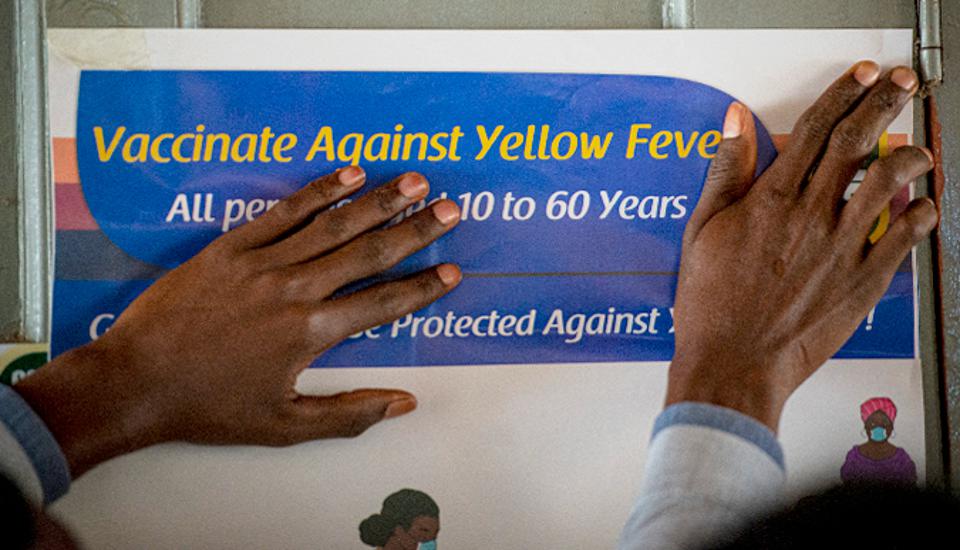
Tony Blair Institute Partners Oracle To Battle Disease Outbreaks In Africa
Even before COVID-19 became a global crisis, multiple African governments had implemented a variety of programs for health checks, testing, and public awareness that were originally developed during the 2014 Ebola pandemic.
Now, a cloud-based system developed by Oracle and implemented in a philanthropic collaboration with the Tony Blair Institute for Global Change (TBI) is helping several African countries speed up data collection and vaccination administration programs to better monitor and combat a variety of diseases, including yellow fever, human papillomavirus, polio, and measles. The program oversaw the vaccination of 75,000 people within its first 10 days.
The cloud-based system eventually will manage the massive immunization program required when COVID-19 vaccines become generally available.
Through its collaboration with TBI and African nations, Oracle will donate its Oracle Health Management System to various African governments, free for the next 10 years. Ghana, Rwanda, and Sierra Leone will be the first to use the system, with the goal of eventually creating a unified, continent-wide system of digitized health records.
“Unlike the United States, where COVID-19 is probably top of mind, these countries are having to deal with many vaccines and many campaigns,” says Katherine Vandebelt, Oracle vice president for clinical innovation. “This provides them with an opportunity to better manage this in a much different way than they’ve ever been able to do before.”
Since COVID-19 was declared a pandemic, TBI has been providing African governments with tools and deploying teams to help governments procure supplies, test and screen patients, deploy contact tracing, and implement other healthcare measures.
Now, physicians and citizens in the participating countries are beginning to use the cloud-based Oracle Health Management System to support large-scale vaccine programs for diseases such as yellow fever, polio, and measles.
Once a COVID-19 vaccine becomes available, the Oracle Cloud system will be used in participating countries to coordinate scheduling and create records of vaccinations. Digital QR codes captured in the system will help Africa reopen its borders and economies by providing citizens with the proof of immunization, or “immunity pass,” they need to move freely for work and travel.
The Oracle Health Management System already is being used in the US to collect data and monitor patient symptoms and responses to early treatments for COVID-19, as well as provide the screening backbone and volunteer registry for the National Institutes of Health’s Covid-19 Prevention Network.
Healthcare Data in the Cloud
More broadly, the Oracle Healthcare Management System can help countries monitor the overall health of their populations by enabling millions of individuals and physicians to record and track healthcare data. By storing that data in the cloud, the problem of exchanging data among disparate systems goes away, says Oracle Executive Vice President Mike Sicilia, who oversees the group at Oracle that developed the system. Patients and providers can input vaccination records, symptoms, test results, and other relevant health information into a web-based app.
To date, there are millions of updates from US patients in the system, the vast majority of which were entered using a mobile device. In Africa, physicians and healthcare workers will be the main users of the system. Ghana President Nana Akufo-Addo has stated that the pandemic has made clear the need to digitize the country’s public health systems for the benefit of the country’s citizens.
“The vaccine administration system is available to every citizen,” Sicilia says. “This is available to countries around the world. And it’s designed to scale to each country’s entire population.”
Awo Ablo, executive director of external relations for TBI, says the COVID-19 pandemic and the adoption of a new digital framework for health monitoring may have opened the door for African countries to get ahead of the curve on digital health systems data.
“There’s a possibility of Africa leaping ahead. There’s the opportunity for a great leap forward, if countries want to take it, to use technology not just for health, but to digitize the economy,” Ablo says.
When government officials ask questions about such systems, they focus on data security and privacy, Oracle’s Vandebelt says. “That’s what Oracle does well,” she says. “Also, we’ve been continually utilizing external bodies to help determine that what we’re building is of the utmost security and has the necessary privacy controls.”

